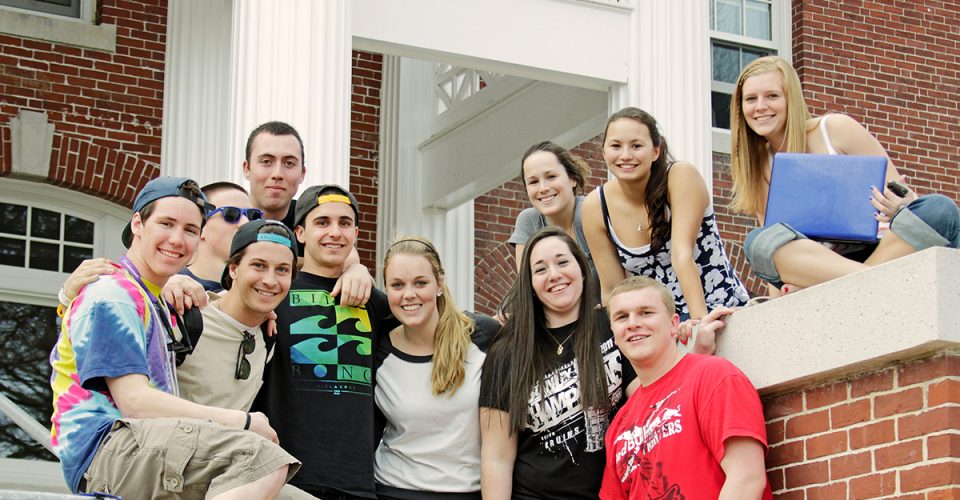PSUnite is a new, multifaceted initiative that is helping first-year students find their niche and avail themselves of all that Plymouth State has to offer. It capitalizes on what makes the Integrated Clusters model so compelling: the ability to see one’s education in action, take learning outside the classroom, share ideas in real time, and leverage the experience of others.
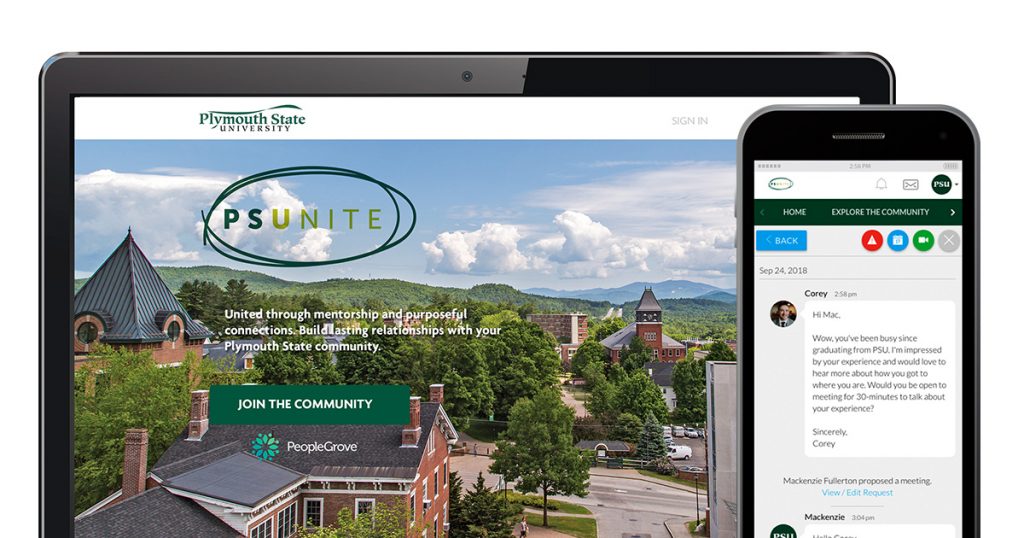
“Wicked Problems”
The current generation is facing some large, seemingly intractable problems: world hunger, gender inequity, technology’s increasing influence, inequities in education, and more. Daunting issues, but also precisely the kind that lend themselves to a cross-disciplinary Clusters approach, which is why PSU is inviting students to tackle these “Wicked Problems”—and many more—in their First-Year Seminars.
Each of the approximately 1,200 first-year students were asked to choose one of some 35 “Wicked Problems” to work on. To enrich the learning experience even further, these students were assigned to residence halls with fellow classmates working on the same problem through the ‘First Year Residential Experience,’ better known as FYRE.
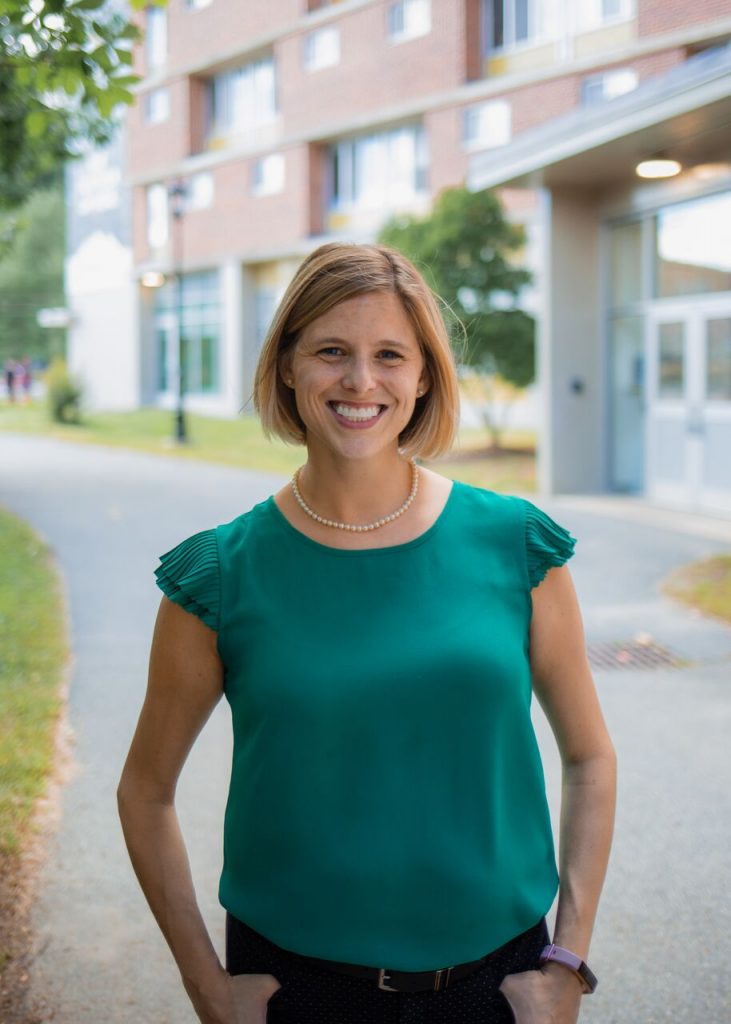
Amanda Grazioso ・ John Tully photo
“Although creating a living/learning community such as this is not unique to Plymouth State, we’re employing some of the best practices for this concept,” notes Director of Residential Life and Dining Services Amanda Grazioso. “We created communities around the various Wicked Problems so that students working on a specific problem are housed in the same building.” Such an approach encourages students to embrace project-based work, Grazioso explains, and also makes it easier for the University to bring resources to students. “Faculty and alumni are making presentations within the residence halls, hosting alumni exploration panels on relevant topics, and the like,” Grazioso continues. “In short, we’re meeting students where they’re at.”
Targeting first-year students allows the University to introduce the concept of sharing campus resources early on, while reminding older students of the many support services available to them, notes Grazioso. “Additionally, bringing classmates together in a shared living environment enables PSU to synchronize learning inside and outside the classroom, providing students with a seamless educational experience.”
The FYRE concept also allows the University to reinforce its general education model regarding the four “habits of mind” (Purposeful Communications, Problem Solving, Integrated Perspective, and Self-Regulated Learning). “We hope that by building our programs on language that’s shared in and out of the classroom, students will become immersed in these habits of mind and integrate them into every aspect of their learning experience,” says Grazioso.
Greek life reimagined
Starting college can be challenging, no matter your circumstances. New surroundings, new friends, new situations—they’re all part of the first-year experience. And the process of finding one’s way can be even more intimidating for the 43 percent of Plymouth State first-years who are first in their family to attend college and the 39 percent who come from economically disadvantaged homes.

Greek service in action—apple picking and pie baking for Gather and Cross Roads House; two local non-profits benefiting Seacoast food pantries and homeless youth and families. Kappa Delta Phi alumni and active sisters spent the day picking apples and baking pies. Over 60 bushels of apples were picked, and 20 pies baked and delivered for local food shelters and families in need. Photo courtesy of Karen Bownes ’85, Kappa Delta Phi NAS.
In addition to First-Year Seminar and the FYRE initiative, President Donald Birx believes that a vibrant campus Greek life will provide a valuable sense of community for students. “I have witnessed, at other institutions and with my own daughter, the important role that properly implemented Greek life can play in student life, success, and achievement,” he says. “I have also seen it done responsibly and with increased leadership on the part of students to set behavior standards that are conducive to a leading university. I believe this will also provide many students with opportunities like our clubs and athletics, which will help them to ‘find their tribe’ within the University community. Greek life, with its emphasis on service, community, leadership, and school pride, can be a powerful vehicle for rounding out a student’s four years on campus.”
Mentoring in the palm of your hand
A strong sense of community is part of the University’s DNA. Alumni have always offered encouragement and guidance to successive generations, and the University also has a tradition of facilitating student mentoring opportunities with faculty and staff. As the institution’s 150th anniversary draws near, President Birx has challenged the Plymouth State family to a stretch goal: provide every first-year student with an alumni mentor through a new initiative: PSUnite.
“By enabling students to make connections early on and giving them tools to navigate college, we create a unified experience and an environment that supports everyone,” notes Director of Alumni Relations Rodney Ekstrom ’09G. “In many respects, we’re doing this already—PSUnite just encapsulates the process.”
The driving force behind PSUnite is the University’s new mentoring platform, an online environment with a smart phone app that will enable alumni across the country and around the world to connect with students in Plymouth. The tool allows both students and alumni to create profiles—from existing or new LinkedIn profiles—then generates mentoring matches based on interests and expressed needs. “For example, an alumnus can say, ‘I can help with mock interviews or résumé reviews,’ and he will be matched with a student looking for that type of guidance,” explains Paula Lee Hobson, vice president for university advancement. “And what’s especially nice is that everything happens within the program environment—people can send e-mails or set up video calls all from our dedicated platform. It’s very user-friendly.”
The University is building this dynamic ecosystem in phased cohorts of 50 students to work out the kinks and familiarize users with the tool, Ekstrom explains. “By the spring, we plan to have an active body of alumni mentors with profiles in the system and working familiarity with the program, so that by the fall of 2019 we can connect every incoming first-year with a mentor match.”
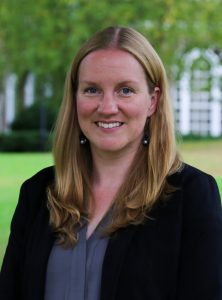
Leslie Blakney ’07 · Mac Fullerton ’17 photo.
Work is already underway to enlist these alumni mentors in beta testing of the program, and early responses are exceedingly positive. “I think this initiative is bold in all the good ways,” observes Leslie Blakney ’07. Blakney, formerly associate director for advising at the Dartmouth Center for Professional Development, recently “came home” to Plymouth as director of career development. “I’m not aware of another institution that’s committed to assigning every first-year student a mentor. This initiative really demonstrates Plymouth State’s commitment to giving students a thoughtful, meaningful college experience.”
Mentoring is especially important to first-generation college students such as she was, Blakney continues. “I wouldn’t be who I am today if it weren’t for those who helped me during my four years at Plymouth State, and I want other students to be able to tell that same story a decade from now.”
Kai Fowler ’13, an account executive at Gartner, the global research and advisory firm, is equally enthusiastic. “Mentoring is crucial for students who are just starting out and may need an extra push or someone to hold them accountable,” he observes. “There are plenty of resources available, but they’re only useful to students who seek them out.”
As a student, Fowler continues, he didn’t start thinking seriously about next steps until his junior year, which was pretty late in the game. And because his parents weren’t familiar with corporate America, he needed guidance. “I had no idea how to navigate the corporate scene, so a couple of my professors advised me on dressing the part, interviewing, writing my résumé, etc.” After graduating, Fowler was eager to pay it forward to other PSU students, but found it difficult to connect with those in need. “I took it upon myself to reach out to Rodney Ekstrom and ask how I could get involved, but not everyone will do that. Identifying students early on who might need help and don’t know where to find it is really important. It’s all about timing, and I think PSUnite is going to be great in that regard.”
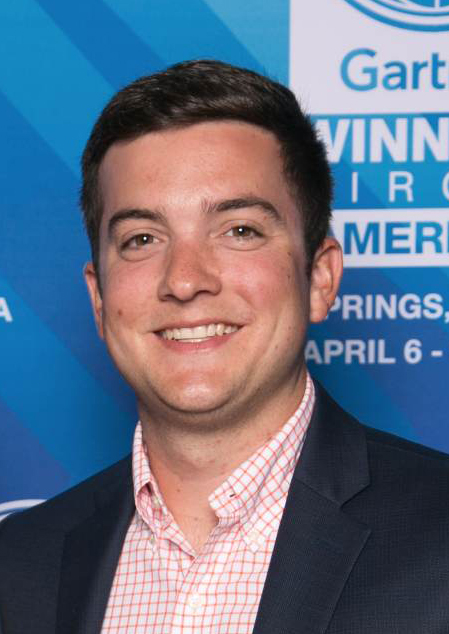
Kai Fowler ’13
Ekstrom agrees. “PSUnite is going to allow us to impact not only current students, but also the community and the state. Career development is not just a transactional thing—it’s about a relationship. Our alumni have ‘street cred’ and the same DNA as the students on campus now, so facilitating these relationships is incredibly valuable. I’m looking forward to hearing the stories that students involved in this initiative tell in a few years.”
Plymouth State is a community with many wonderful stories of triumph over adversity, observes Hobson, and PSUnite promises to enliven the fabric of experiences even further. “We’ve long enjoyed a tradition of alumni mentoring, but our former manual process could not be taken to scale the way it will be with PSUnite. We have more than 37,000 living alumni. They have enjoyed successful careers in a wide array of disciplines, and I know they have rich experiences and advice to share.
“Alumni share their personal stories with us—some screamingly funny, many touchingly wonderful. They tell us about the barriers they overcame, and how their Plymouth State experience changed them, forever. Our students need to know that this will be true for them, too,” Hobson concludes. “We couldn’t be more excited to launch PSUnite.”





